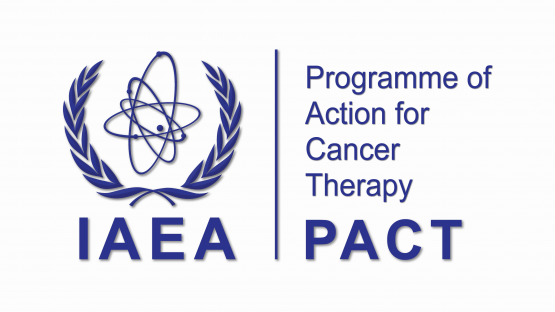On the occasion of World Cancer Day (4 February), the Director General of the IAEA and Nobel Prize Laureate Dr. Mohamed ElBaradei met to discuss PACT with Dr. Mark Clanton, Deputy Director of the Delivery Systems in the Office of the Director of the NCI. Dr. Clanton also met with other senior staff at the IAEA to exchange views on the most effective ways of joint activities between the NCI and PACT Programme Office (PPO).
The NCI is the United States Government's principal agency for cancer research and training. NCI's immediate goal is to eliminate the suffering and death due to cancer, a bold and ambitious goal, for which its strategy is: prevention, early identification, treatment, and control of cancers it cannot eliminate so they become manageable, chronic diseases. NCI recognizes that critical to ultimate success are the global collaborations and partnerships necessary to further scientific discovery, to translate that discovery into the development of better prevention, detection, and treatment methods, and to deliver that progress to all who are in need.
In light of their shared objectives, Dr. ElBaradei and Dr. Clanton recognized the value of partnership and collaboration between the IAEA and NCI. They agreed to identify shortly concrete cooperative endeavours to cement the ties between the IAEA and NCI, including joint projects and activities. Dr. Clanton said that, “I am impressed with the vision of PACT, by its substantial progress with scant resources, and by its plans to translate its vision into action.” He confirmed that, “there are important ways in which the National Cancer Institute can collaborate with the IAEA towards the realization of improved global cancer control”.
In June 2004, the Board of Governors of the International Atomic Energy Agency (IAEA) approved a new Program of Action for Cancer Therapy (PACT). The goal of PACT is to respond effectively to the looming crisis posed by the increase in cancer in developing countries by addressing the human, technical and regulatory resources needed to establish, improve, or expand radiotherapy treatment programs in the context of national cancer control strategies. IAEA cannot do this alone. Thus, PACT is building an alliance of interested parties who are committed to addressing the challenge of cancer in low and middle income countries in all of its aspects.
Partnerships are essential for the success of PACT. The General Conference of the IAEA recognized this in its annual resolution in 2004, when it emphasized the significance of partnerships with governmental, national, non-governmental and private-sector organizations. The IAEA has already developed close ties with the World Health Organization (WHO) and the International Agency for Research on Cancer (IARC), and the World Health Assembly welcomed PACT in 2005.


